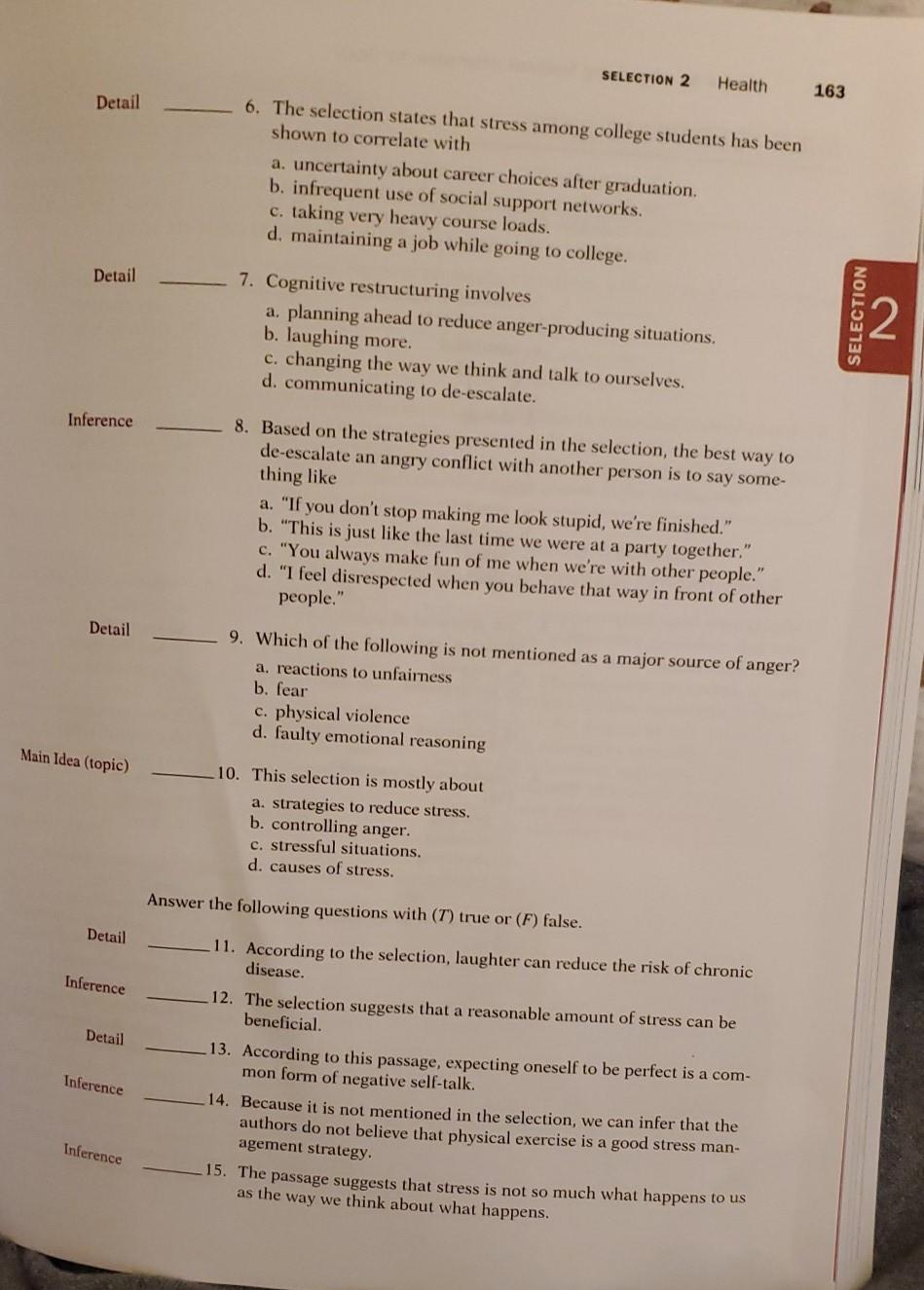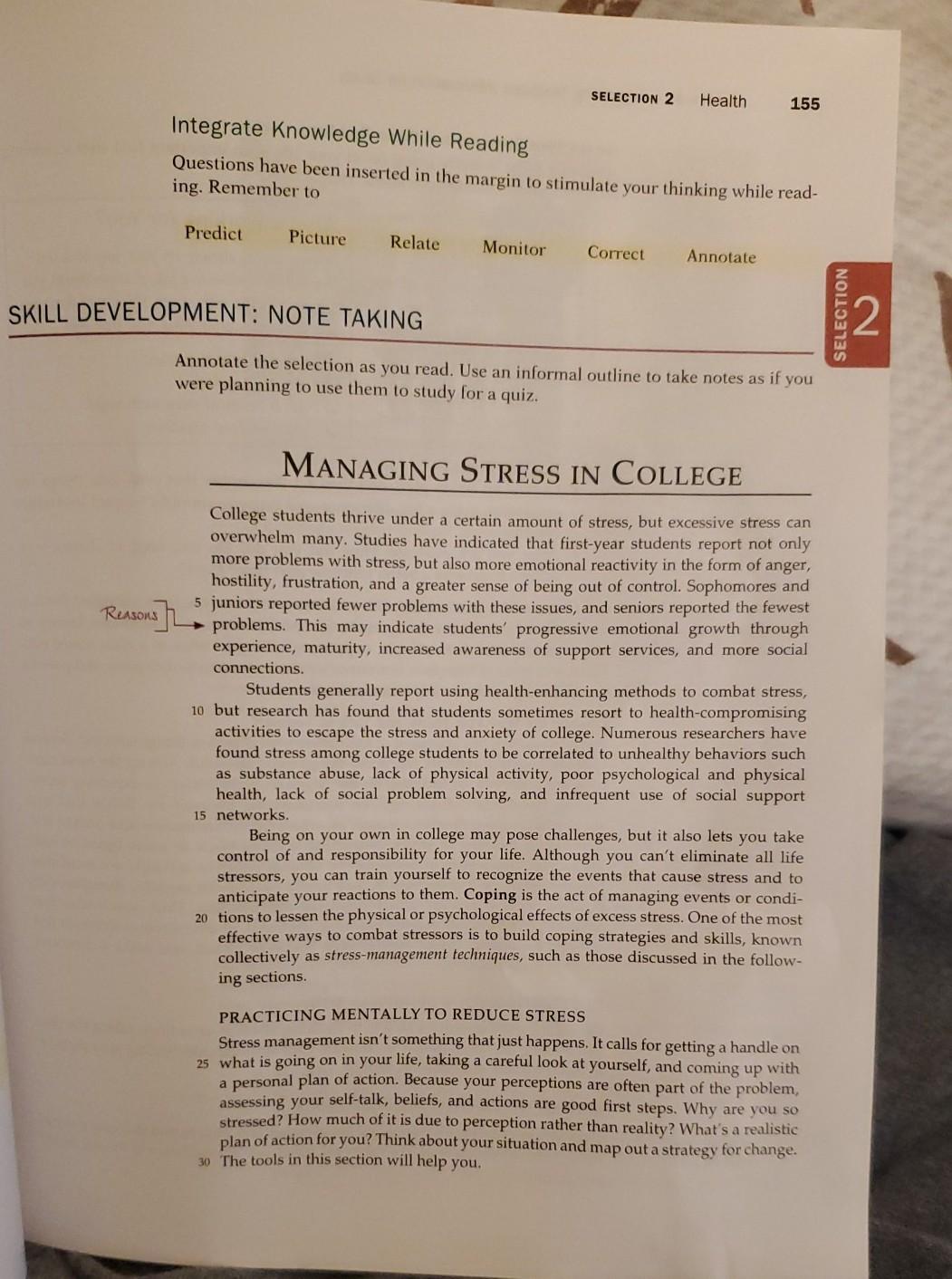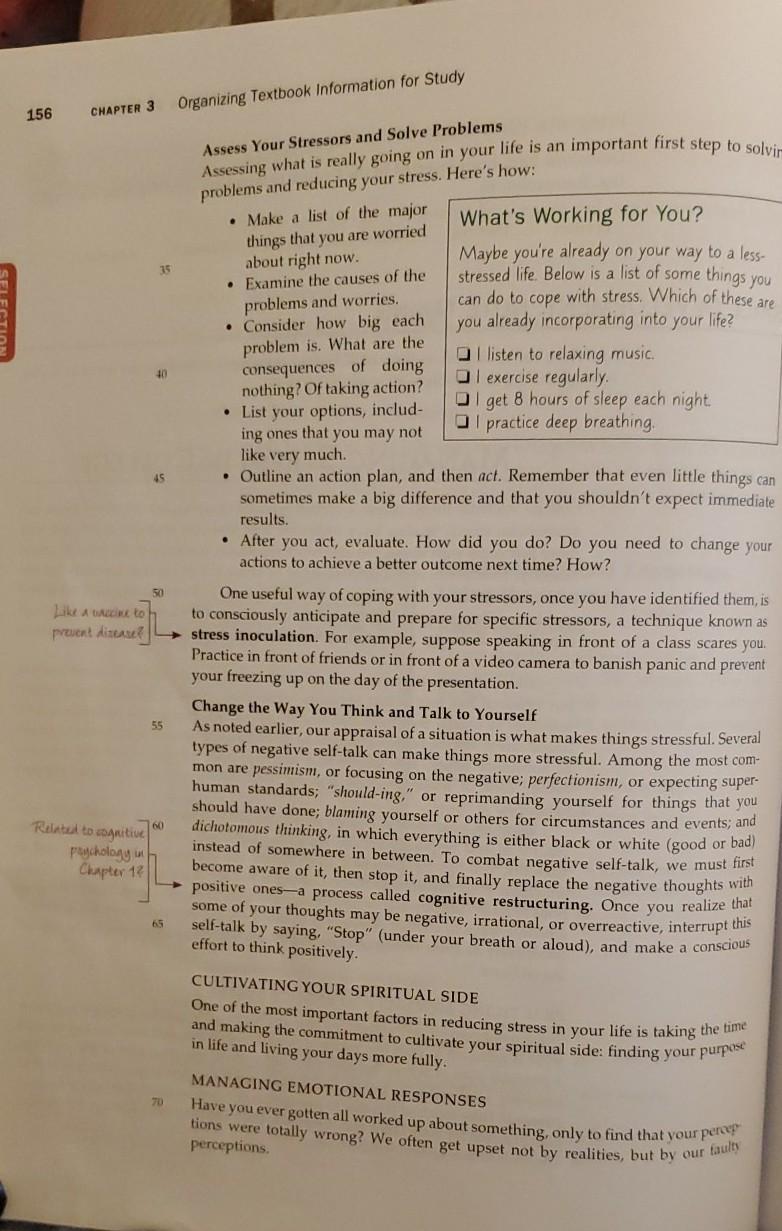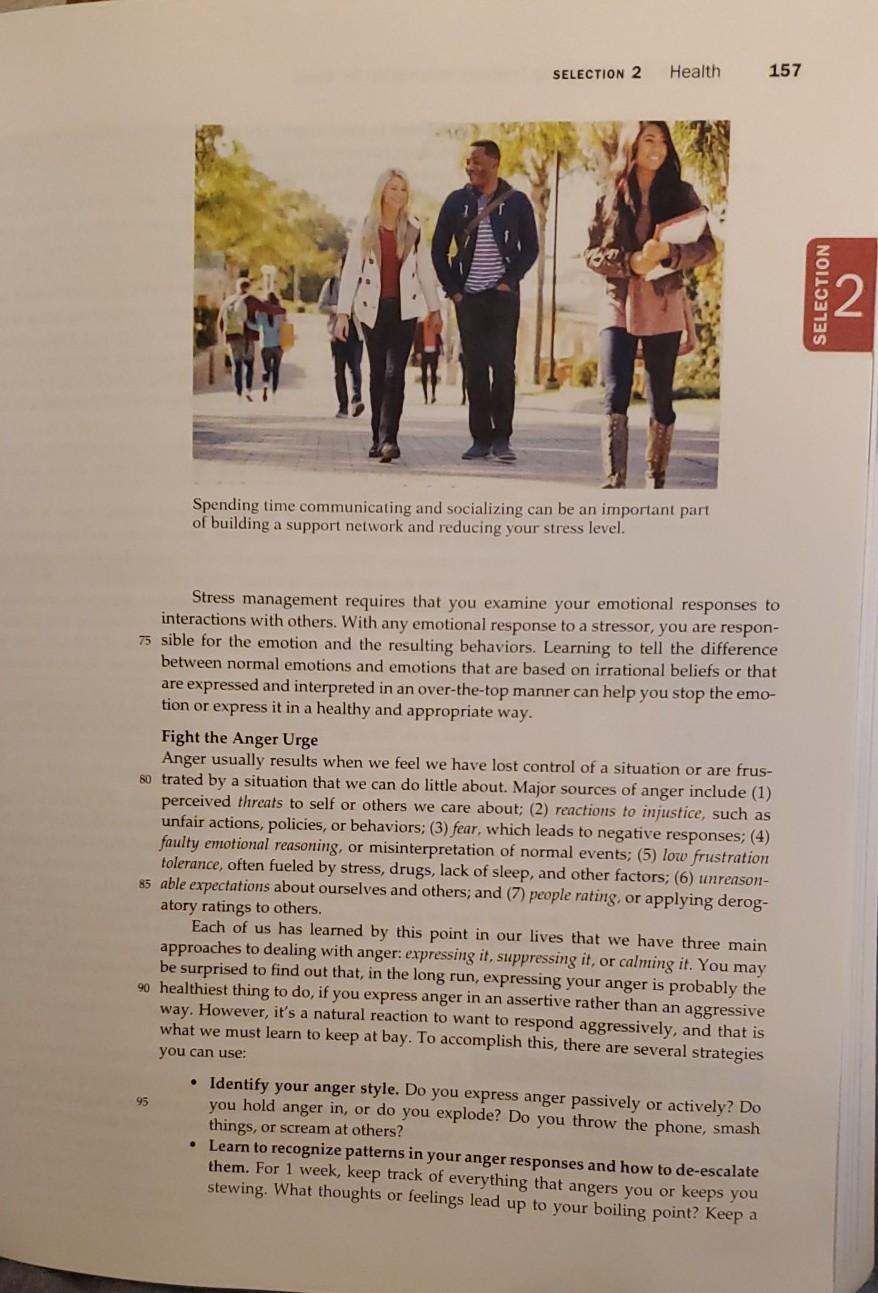Answered step by step
Verified Expert Solution
Question
1 Approved Answer
SELECTION 2 Health 163 Detail 6. The selection states that stress among college students has been shown to correlate with a. uncertainty about career choices




SELECTION 2 Health 163 Detail 6. The selection states that stress among college students has been shown to correlate with a. uncertainty about career choices after graduation. b. infrequent use of social support networks. c. taking very heavy course loads. d. maintaining a job while going to college. Detail 7. Cognitive restructuring involves a. planning ahead to reduce anger-producing situations. b. laughing more. c. changing the way we think and talk to ourselves. d. communicating to de-escalate. SELECTION N Inference 8. Based on the strategies presented in the selection, the best way to de-escalate an angry conflict with another person is to say some- thing like a. "If you don't stop making me look stupid, we're finished." b. "This is just like the last time we were at a party together." c. "You always make fun of me when we're with other people." d. "I feel disrespected when you behave that way in front of other people." Detail 9. Which of the following is not mentioned as a major source of anger? a. reactions to unfairness b. fear c. physical violence d. faulty emotional reasoning Main Idea (topic) 10. This selection is mostly about a, strategies to reduce stress, b. controlling anger. c. stressful situations. d. causes of stress. Answer the following questions with (T) true or (F) false. Detail Inference Detail 11. According to the selection, laughter can reduce the risk of chronic disease. 12. The selection suggests that a reasonable amount of stress can be beneficial 13. According to this passage, expecting oneself to be perfect is a com- mon form of negative self-talk. 14. Because it is not mentioned in the selection, we can infer that the authors do not believe that physical exercise is a good stress man- agement strategy. 15. The passage suggests that stress is not so much what happens to us as the way we think about what happens. Inference Inference SELECTION 2 Health 155 Integrate Knowledge While Reading Questions have been inserted in the margin to stimulate your thinking while read- ing. Remember to Predict Picture Relate Monitor Correct Annotate SKILL DEVELOPMENT: NOTE TAKING SELECTION 2 Annotate the selection as you read. Use an informal outline to take notes as if you were planning to use them to study for a quiz. MANAGING STRESS IN COLLEGE Reasons College students thrive under a certain amount of stress, but excessive stress can overwhelm many. Studies have indicated that first-year students report not only more problems with stress, but also more emotional reactivity in the form of anger, hostility, frustration, and a greater sense of being out of control. Sophomores and 5 juniors reported fewer problems with these issues, and seniors reported the fewest problems. This may indicate students' progressive emotional growth through experience, maturity, increased awareness of support services, and more social connections. Students generally report using health-enhancing methods to combat stress, 10 but research has found that students sometimes resort to health-compromising activities to escape the stress and anxiety of college. Numerous researchers have found stress among college students to be correlated to unhealthy behaviors such as substance abuse, lack of physical activity, poor psychological and physical health, lack of social problem solving, and infrequent use of social support 15 networks. Being on your own in college may pose challenges, but it also lets you take control of and responsibility for your life. Although you can't eliminate all life stressors, you can train yourself to recognize the events that cause stress and to anticipate your reactions to them. Coping is the act of managing events or condi- 20 tions to lessen the physical or psychological effects of excess stress. One of the most effective ways to combat stressors is to build coping strategies and skills, known collectively as stress-management techniques, such as those discussed in the follow- ing sections. PRACTICING MENTALLY TO REDUCE STRESS Stress management isn't something that just happens. It calls for getting a handle on 25 what is going on in your life, taking a careful look at yourself, and coming up with a personal plan of action. Because your perceptions are often part of the problem, assessing your self-talk, beliefs, and actions are good first steps. Why are you so stressed? How much of it is due to perception rather than reality? What's a realistic plan of action for you? Think about your situation and map out a strategy for change. 30 The tools in this section will help you. Have you ever gotten all worked up about something, only to find that your percep Organizing Textbook Information for Study 156 CHAPTER 3 Assess Your Stressors and Solve Problems Assessing what is really going on in your life is an important first step to solvir problems and reducing your stress. Here's how: Make a list of the major What's Working for you? things that you are worried about right now. Maybe you're already on your way to a less- Examine the causes of the stressed life. Below is a list of some things you problems and worries. can do to cope with stress. Which of these are Consider how big each you already incorporating into your life? problem is. What are the I listen to relaxing music. consequences of doing nothing? Of taking action? Ol exercise regularly List your options, includ- I get 8 hours of sleep each night ing ones that you may not I practice deep breathing like very much Outline an action plan, and then act. Remember that even little things can sometimes make a big difference and that you shouldn't expect immediate results 35 10 Like a bit to prouent disease 55 After you act, evaluate. How did you do? Do you need to change your actions to achieve a better outcome next time? How? One useful way of coping with your stressors, once you have identified them, is to consciously anticipate and prepare for specific stressors, a technique known as stress inoculation. For example, suppose speaking in front of a class scares you. Practice in front of friends or in front of a video camera to banish panic and prevent your freezing up on the day of the presentation. Change the Way You Think and Talk Yourself As noted earlier, our appraisal of a situation is what makes things stressful. Several types of negative self-talk can make things more stressful. Among the most com- mon are pessimism, or focusing on the negative; perfectionism, or expecting super- human standards; "should-ing," or reprimanding yourself for things that you should have done; blaming yourself or others for circumstances and events; and dichotomous thinking, in which everything is either black or white (good or bad instead of somewhere in between. To combat negative self-talk, we must first become aware of it, then stop it, and finally replace the negative thoughts with positive ones a process called cognitive restructuring. Once you realize that some of your thoughts may be negative, irrational, or overreactive, interrupt this self-talk by saying, "Stop" (under your breath or aloud), and make a conscious effort to think positively. 00 Related to cognitive paychology Chapter 12 CULTIVATING YOUR SPIRITUAL SIDE One of the most important factors in reducing stress in your life is taking the time and making the commitment to cultivate your spiritual side: finding your purpose in life and living your days more fully. MANAGING EMOTIONAL RESPONSES perceptions SELECTION 2 Health 157 SELECTION 2 Spending time communicating and socializing can be an important part of building a support network and reducing your stress level. Stress management requires that you examine your emotional responses to interactions with others. With any emotional response to a stressor, you are respon- 75 sible for the emotion and the resulting behaviors. Learning to tell the difference between normal emotions and emotions that are based on irrational beliefs or that are expressed and interpreted in an over-the-top manner can help you stop the emo- tion or express it in a healthy and appropriate way. Fight the Anger Urge Anger usually results when we feel we have lost control of a situation or are frus- 80 trated by a situation that we can do little about. Major sources of anger include (1) perceived threats to self or others we care about; (2) reactions to injustice, such as unfair actions, policies, or behaviors; (3) fear, which leads to negative responses; (4) faulty emotional reasoning, or misinterpretation of normal events; (5) low frustration tolerance, often fueled by stress, drugs, lack of sleep, and other factors; (6) unreason- 85 able expectations about ourselves and others; and (7) people rating, or applying derog- atory ratings to others. Each of us has learned by this point in our lives that we have three main approaches to dealing with anger: expressing it, suppressing it, or calming it. You may be surprised to find out that, in the long run, expressing your anger is probably the 90 healthiest thing to do, if you express anger in an assertive rather than an aggressive way. However, it's a natural reaction to want to respond aggressively, and that is what we must learn to keep at bay. To accomplish this, there are several strategies you can use: 95 Identify your anger style. Do you express anger passively or actively? Do you hold anger in, or do you explode? Do you throw the phone, smash things, or scream at others? Learn to recognize patterns in your anger responses and how to de-escalate them. For 1 week, keep track of everything that angers you or keeps you stewing. What thoughts or feelings lead up to your boiling point? Keep a
Step by Step Solution
There are 3 Steps involved in it
Step: 1

Get Instant Access to Expert-Tailored Solutions
See step-by-step solutions with expert insights and AI powered tools for academic success
Step: 2

Step: 3

Ace Your Homework with AI
Get the answers you need in no time with our AI-driven, step-by-step assistance
Get Started


